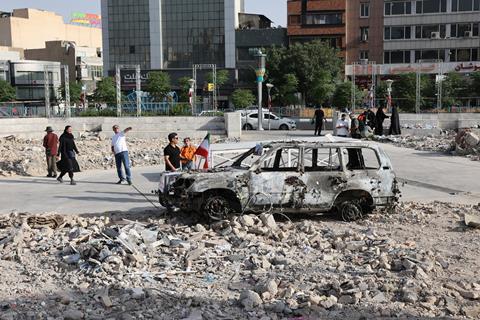Donald Trump may have floated the idea of regime change in Iran, but would it be good for Iranian Christians? That depends on who takes over, says Ben Cohen. But right now, the nation’s beleaguered evangelicals need our prayers

It’s a time of deep anxiety and uncertainty for all of Iran’s citizens. However, as Israeli airstrikes continue and Donald Trump urges Tehran’s 15 million citizens to flee the city, there is one group who have good cause to feel doubly vulnerable right now.
The situation for Iran’s estimated 300,000 evangelical Christians was already dire before the current crisis. Now, as bombs fall and the regime feels increasingly beleaguered, they will be fearing that the already considerable persecution and repression they face could be further ratcheted up.
Already under siege
To understand the current fears, we must first grasp how the Iranian state views evangelical Christians. In Revolutionary Courts, judges routinely refer to evangelicals as “Zionist Christians” — a deliberate attempt to paint them as foreign agents and enemies of the state. This is different from how the regime treats Armenian and Assyrian Christians, who are recognised and tolerated as ethnic minorities, although by no means free in how they practise their faith.
The Supreme Leader’s directive from 15 years ago, which continues to be cited in court judgements today, explicitly calls upon the Islamic Revolutionary Guard Corps (IRGC) and other custodians of the Islamic Republic, to recognise that “the spread of house-churches are among the critical threats” facing Iran.
It might be comforting to assume that whoever replaced the IRGC would be an improvement, but history shows that isn’t a given
The evidence of escalating persecution is stark. There is increased antipathy toward evangelicals. In court, we regularly hear how Christians are insulted and treated harshly, referred to as “filthy, dirty threats”. These charges are only likely to become harsher as state paranoia grows.
My immediate thoughts turn to those believers currently imprisoned, particularly in Tehran’s notorious Evin Prison (which was bombed earlier this week) – their sole ‘crime’ is generally involvement in one of the country’s house churches. This facility lies in the district that residents were told to evacuate as Israeli strikes approached. Kylie Moore-Gilbert, an Australian-British former prisoner of Evin, captured the horror perfectly when she said she “couldn’t imagine what it’d be like to be in prison as these bombs are falling and you don’t really know what’s going on outside, you have no idea. You’re just hearing rumours”.
Faith under fire
It might be tempting to imagine that Iranian Christians would welcome any action that might topple a regime that has persecuted them so relentlessly. However, the signs are that this isn’t how they feel. Despite their differences with the government, there is a general sense among Iranians that it’s not for another outside agent to overthrow the government. It might also be comforting to assume that whoever replaced the IRGC and its tyrannical theocracy would be an improvement, but history shows that it isn’t a given, no matter how dire the existing regime.
Last year alone, we saw six times the cumulative length of prison sentences handed down to Christians in Iran
I have stressed that Christians, especially evangelicals, would have every reason to view the future with a great deal of trepidation. However, along with the fear of bombs and further scapegoating as “Zionist” enemies of the state, there is one other thing that I know will be foremost in their minds.
What strikes me most about Iran’s Christians is their remarkable faithfulness amid suffering. Even in these dark times, they remain focused on God’s will being done and are concerned about spreading the gospel - this is ultimately what gets them in trouble in the first place. During the recent “Woman, Life, Freedom” protests, many Christians were among those handing out sandwiches and supporting fellow Iranians, living out their faith through service.
The need for prayer
Iran’s Christians have a deep faith that God is ultimately in control and makes kingdoms rise and fall. They pray that in the current circumstances even more people will come to know the love and mercy of God. Just as they pray for new opportunities for witness and service in the darkest of times, we should be praying for them.
As we watch events unfold in the Middle East, let’s not forget these faithful believers caught between bombs and persecution. They need our prayers, advocacy and solidarity, now more than ever. In their remarkable faith and commitment to the gospel, they offer us all a powerful example of what it means to follow Christ in the darkest of times.
This article was compiled in conjunction with Steve Dew-Jones, news director of Article 18, a partner organisation of Open Doors who advocate for Iran’s persecuted Christian minority






































No comments yet